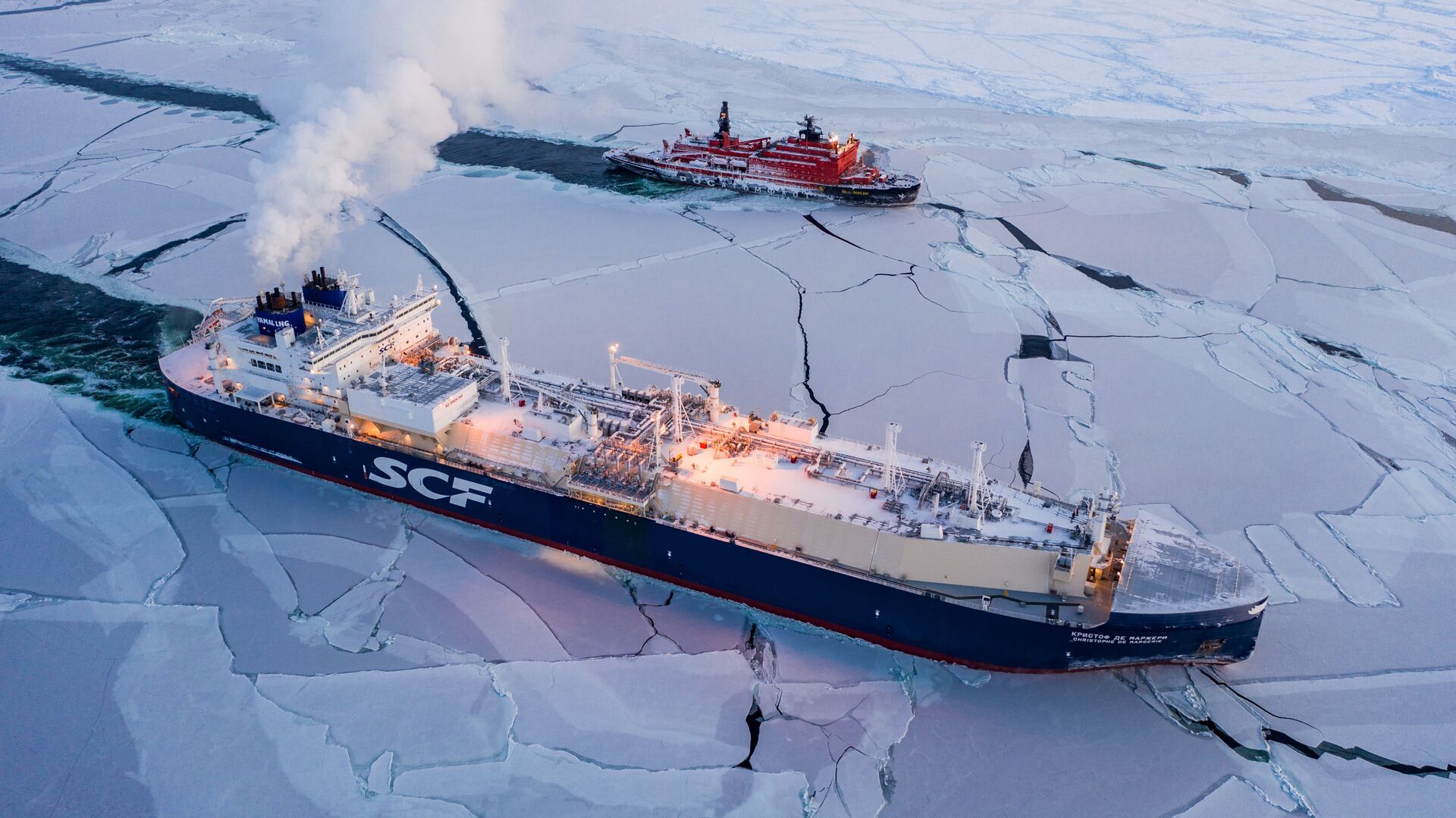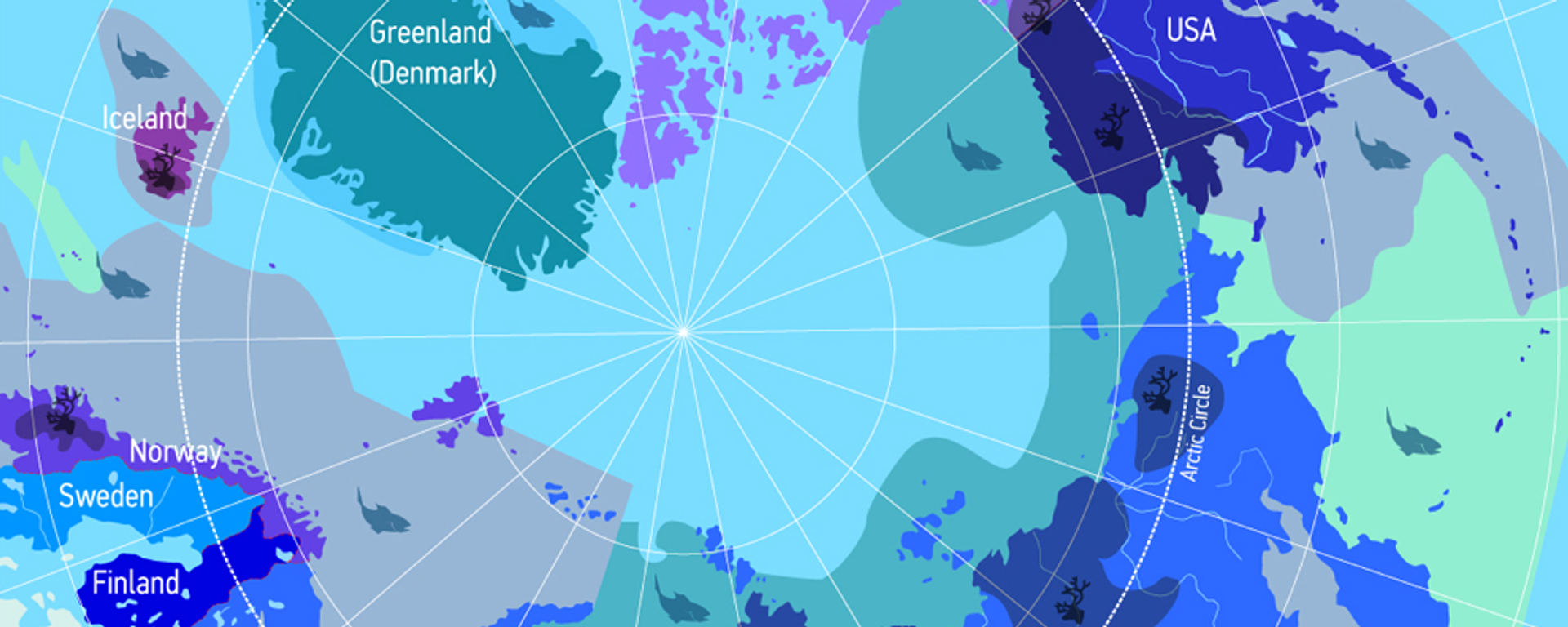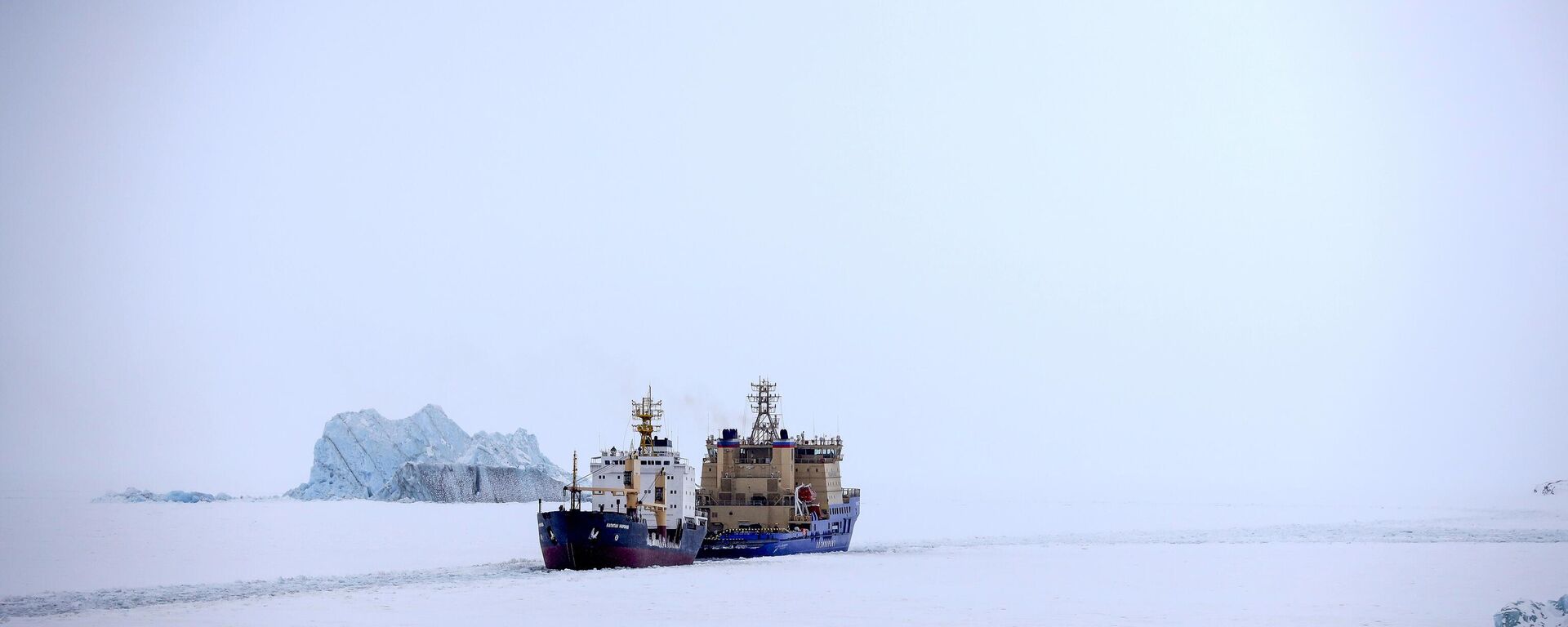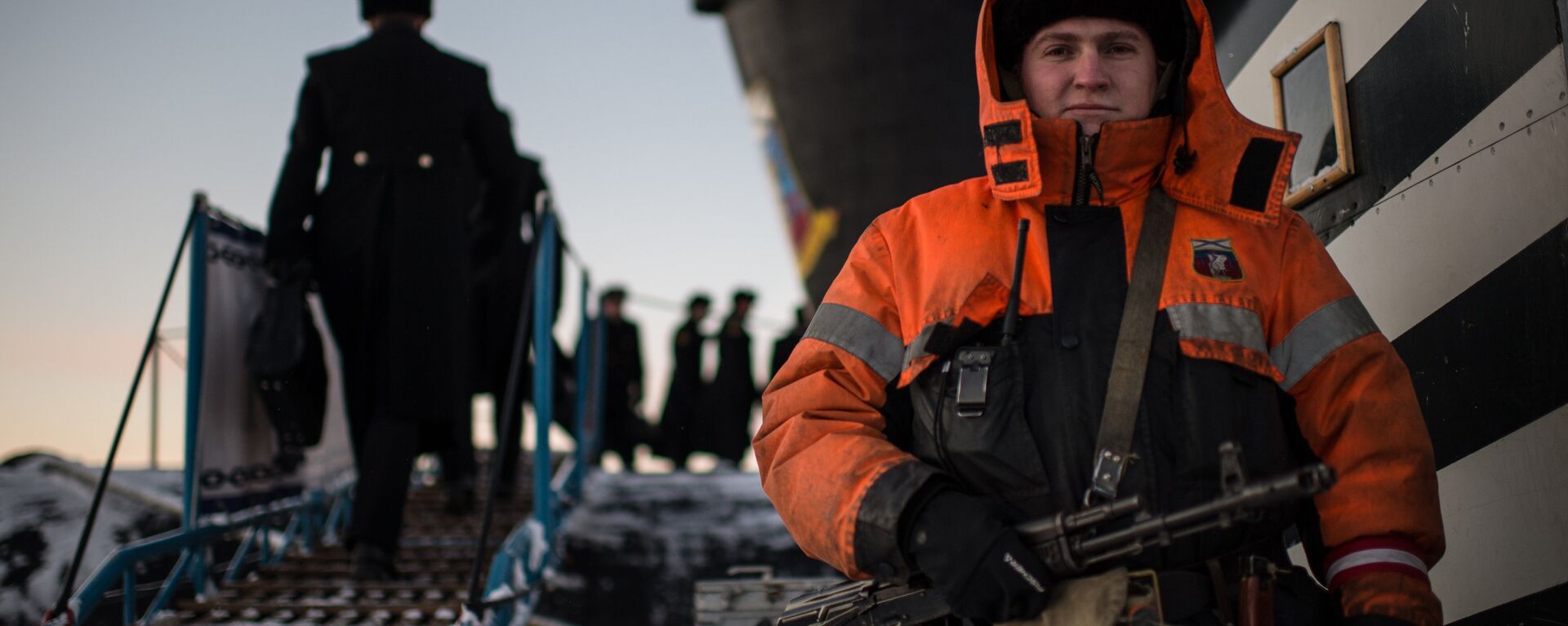https://sputnikglobe.com/20240602/distance-speed-security-heres-why-west-is-salivating-over-russias-northern-sea-route-1118748493.html
Distance, Speed, Security: Here's Why West is Salivating Over Russia’s Northern Sea Route
Distance, Speed, Security: Here's Why West is Salivating Over Russia’s Northern Sea Route
Sputnik International
A leading US mainstream news publication has touted the potential upside of using Russia’s Arctic Northern Sea Route as instability in the Middle East wreaks havoc on Western shipping giants’ respective bottom lines. Sputnik asked a leading Russian Arctic expert what’s behind the West’s sudden warming to Russia’s ambitious new shipping route.
2024-06-02T17:18+0000
2024-06-02T17:18+0000
2024-06-02T17:18+0000
analysis
russia
arctic
houthi
houthis
northern sea route
suez canal
https://cdn1.img.sputnikglobe.com/img/07e5/02/16/1082155846_0:197:3075:1926_1920x0_80_0_0_052c7a8f8bb161f7747882d724d6c629.jpg
Yemen’s Houthi militia show no signs of stopping their Red and Arabian Sea campaign of drone and missile attacks targeting Israeli-linked merchant ships, and the commercial fleets of their American and British allies. Their partial blockade of the vital maritime artery has seen commercial tonnage passing through the area drop by sixty percent or more since October.The Houthis say their attacks will stop when Israel halts the war in Gaza. Israeli officials have hinted at the potential viability of a new ceasefire, but embattled Prime Minister Benjamin Netanyahu has vowed that there will be no ceasefire until Israel’s goal of destroying Hamas is achieved.In the meantime, Israeli and Western shipping companies will have to continue crying into their pocketbooks as exorbitant insurance prices, the costs in fuel and lost time resulting from having to divert massive large ships to alternative routes continue to eat into their respective bottom lines.Amid the crisis, Foreign Policy magazine has pondered whether Russia’s Northern Sea Route might not be the alternative Western shippers are looking for. The route is shorter, quicker, and most importantly, more secure than all of its alternatives.The only ‘problem’, says the outlet, is that the whole thing is controlled by Russia.There are “many factors” which make the Northern Sea Route attractive, and it’s no surprise that Western media has perked up its ears and suddenly expressed interest in the project, says Alexander Vorotnikov, coordinator of the Project Office for the Development of the Arctic and associate professor at the Institute of Social Sciences at the Russian Presidential Academy of National Economy and Public Administration.There are also other factors affecting shippers’ respective bottom lines, the observer indicated, including fuel and crew costs.Economics is one thing, politics is something else, the observer stated, with the West’s apparent interest in the Northern Sea Route while waging an aggressive proxy war against Russia highlighting the “double standards” of Western policies. This applies not only to the Northern Sea Route, but for example to efforts to sanction Moscow into submission while continuing the purchase of Russian oil, liquefied gas, etc.For Russia, the Northern Sea Route isn’t tied to the whims or interests of Western powers, according to Vorotnikov, with the project instead connected to Russia’s pivot to the east policy, “becoming an active instrument for pursuing such a policy.”The Northern Sea Route isn’t just a bid by Russia to sit in one place and charge transit fees for cargoes shuttling between Europe and Asia, but an opportunity for companies from Russia and other countries of the post-Soviet space to find a viable route to deliver goods to China, India and other BRICS and developing world partners, and vice versa.As for the West, “they can say or declare one thing, but as a rule always use every available opportunity,” Vorotnikov said, pointing to the softening narrative on Russian assets frozen in Europe as an example of the difference between “political rhetoric” and legal language and financial interests.As for threats by some Western countries (the United States in particular) to try to turn the Northern Sea Route into an open body of water with ‘freedom of navigation’ not tied to any national jurisdiction, they aren’t based in reality, Vorotnikov believes.
https://sputnikglobe.com/20240601/houthis-red-sea-blockade-makes-russias-northern-sea-route-attractive-to-desperate-west-1118736407.html
https://sputnikglobe.com/20240517/why-does-deepening--russia-china-arctic-partnership-bother-nato-1118496230.html
https://sputnikglobe.com/20240601/how-northern-fleet-guards-russias-arctic-as-new-cold-war-heats-up-1118740169.html
russia
arctic
Sputnik International
feedback@sputniknews.com
+74956456601
MIA „Rossiya Segodnya“
2024
News
en_EN
Sputnik International
feedback@sputniknews.com
+74956456601
MIA „Rossiya Segodnya“
Sputnik International
feedback@sputniknews.com
+74956456601
MIA „Rossiya Segodnya“
what is the northern sea route, can western countries use northern sea route, why is west interested in northern sea route, is northern sea route shorter
what is the northern sea route, can western countries use northern sea route, why is west interested in northern sea route, is northern sea route shorter
Distance, Speed, Security: Here's Why West is Salivating Over Russia’s Northern Sea Route
A leading US mainstream news publication has touted the potential upside of using Russia’s Arctic Northern Sea Route as instability in the Middle East wreaks havoc on Western shipping giants’ respective bottom lines. Sputnik asked a leading Russian Arctic expert what’s behind the West’s sudden warming to Russia’s ambitious new shipping route.
Yemen’s Houthi militia show no signs of stopping their Red and Arabian Sea campaign of drone and missile attacks targeting Israeli-linked merchant ships, and the commercial fleets of their American and British allies. Their partial blockade of the vital maritime artery has seen commercial tonnage passing through the area drop by sixty percent or more since October.
The Houthis say their attacks will stop when Israel halts the war in Gaza. Israeli officials have
hinted at the potential viability of a new ceasefire, but embattled Prime Minister Benjamin Netanyahu has
vowed that there will be no ceasefire until Israel’s goal of destroying Hamas is achieved.
In the meantime, Israeli and Western shipping companies will have to continue crying into their pocketbooks as exorbitant insurance prices, the costs in fuel and lost time resulting from having to divert massive large ships to alternative routes continue to eat into their respective bottom lines.
Amid the crisis, Foreign Policy magazine has
pondered whether Russia’s Northern Sea Route might not be the alternative Western shippers are looking for. The route is shorter, quicker, and most importantly, more secure than all of its alternatives.
The only ‘problem’, says the outlet, is that the whole thing is controlled by Russia.
There are “many factors” which make the Northern Sea Route attractive, and it’s no surprise that Western media has perked up its ears and suddenly expressed interest in the project, says Alexander Vorotnikov, coordinator of the Project Office for the Development of the Arctic and associate professor at the Institute of Social Sciences at the Russian Presidential Academy of National Economy and Public Administration.
“First, there’s distance. The Northern Sea Route is naturally much shorter, depending on where the ship is arriving – China, Japan, Murmansk, Rotterdam, for example. The distance can be reduced by half depending on the route. This is a very important factor. Accordingly, if the distance is reduced, delivery times also change,” Vorotnikov told Sputnik, adding that even absent the present tensions in the Middle East, the length of the route and delivery times are potentially much shorter than via the Suez Canal.
There are also other factors affecting shippers’ respective bottom lines, the observer indicated, including fuel and crew costs.
“And one more thing should be remembered – that passage through the Suez Canal may be limited by a vessel’s dimensions. Not all ships can pass through the Suez Canal. Moreover, large tankers are not able to pass through it,” Vorotnikov said, adding that all these factors together naturally “make the Northern Sea Route attractive for other countries.”
Economics is one thing, politics is something else, the observer stated, with the West’s apparent interest in the Northern Sea Route while waging an aggressive proxy war against Russia highlighting the “double standards” of Western policies. This applies not only to the Northern Sea Route, but for example to efforts to sanction Moscow into submission while continuing the purchase of Russian oil, liquefied gas, etc.
For Russia, the Northern Sea Route isn’t tied to the whims or interests of Western powers, according to Vorotnikov, with the project instead connected to Russia’s pivot to the east policy, “becoming an active instrument for pursuing such a policy.”
The Northern Sea Route isn’t just a bid by Russia to sit in one place and charge transit fees for cargoes shuttling between Europe and Asia, but an opportunity for companies from Russia and other countries of the post-Soviet space to find a viable route to deliver goods to China, India and other BRICS and developing world partners, and vice versa.
As for the West, “they can say or declare one thing, but as a rule always use every available opportunity,” Vorotnikov said, pointing to the softening narrative on
Russian assets frozen in Europe as an example of the difference between “political rhetoric” and legal language and financial interests.
As for threats by some Western countries (the United States in particular) to try to turn the Northern Sea Route into an open body of water with ‘freedom of navigation’ not tied to any national jurisdiction, they aren’t based in reality, Vorotnikov believes.
“From my point of view, they don’t have anything to counter Russia in the Arctic today. Russia has been paying close attention to the development of its national security in the Arctic zone for many years, several decades. This has been important not only in the context of a potential conflict over the Arctic, but protecting the Northern Sea Route from possible provocations. Many new military bases have been built, new airfields have been created, and our S-400 [air and missile defense installations, ed.] have been deployed on many Arctic islands,” the observer pointed out.





